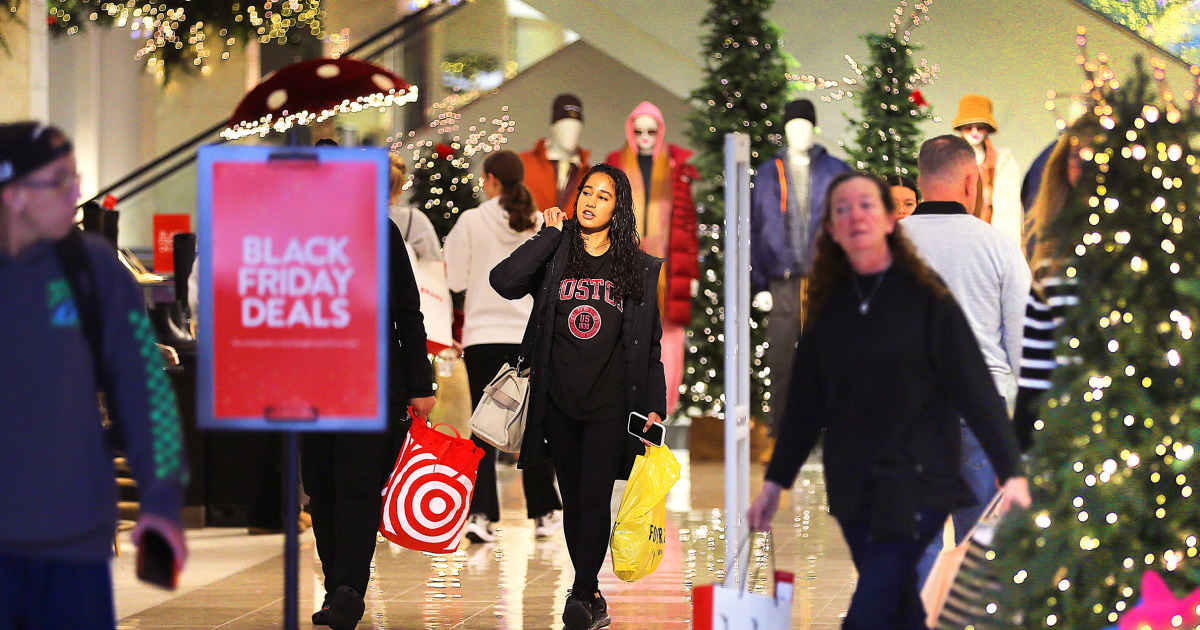As the holiday shopping season starts to kick into high gear, Americans are balancing Black Friday deals with lingering concerns about their own finances.
Consumers are looking to shell out less this holiday season, new data from Deloitte shows. Surveyed shoppers said they plan to spend 4% less than last year between Black Friday and Cyber Monday, citing higher costs of living and more fear of the economy.
It’s a reversal. Previous Deloitte surveys dating back to 2021 had shown shoppers planned to spend more than previous years during the post-Thanksgiving weekend.
The pullback is expected to hit both ends of the income spectrum. Consumers making less than $50,000 a year are expected to spend 12% less than last year, according to the business services firm. Shoppers making more than $200,000 a year say they’ll cut their spending by 18%.
“While we expect shoppers to plan to pull back on spending, we also anticipate strong participation throughout the holiday week,” Natalie Martini, Deloitte’s vice chair and U.S. retail and consumer products leader, said in a press release.
The firm surveyed 1,200 consumers across the United States between Oct. 15 and Oct. 23.
Shoppers are hitting the malls and retail websites at a precarious time, with Americans feeling increasingly fearful about both the broader economy and their personal finances. Consumer confidence hit one of the lowest levels on record in November, according to the University of Michigan’s consumer sentiment survey that was released Friday. It’s just slightly above the June 2022 low, when inflation was soaring.
Voters cited affordability as a top concern during November’s elections, fueling Democratic wins in Virginia, New Jersey and New York City. President Donald Trump has tried to address rising food costs by eliminating many of the tariffs he imposed this year on food imports, including beef and coffee from Brazil.
The University of Michigan report found that consumers were particularly worried about their jobs and personal finances: 69% of respondents said they expect unemployment to increase over the next year, twice the percentage from a year ago.
“After the federal shutdown ended, sentiment lifted slightly from its mid-month reading,” wrote Joanne Hsu, the director of consumer surveys at the school. “However, consumers remain frustrated about the persistence of high prices and weakening incomes.”
The rate of inflation, which slowed earlier this year, has been climbing since April, according to federal data, reaching an annual rate of 3% in September. That’s stinging Americans’ wallets, and many aren’t expecting relief anytime soon. Respondents in the University of Michigan consumer sentiment survey expect inflation to hit 4.5% by next year.
Retail earnings reports over the past few weeks point to some troubling consumer trends. Walmart posted strong results last week as the discount retailer benefited from shoppers looking to save money on core items like groceries and other staples. The company said higher-income families are shopping more at the store in search of bargains, while lower-income families are under greater financial strain.
“As pocketbooks have been stretched, you’re seeing more consumer dollars go to necessities versus discretionary items,” said John David Rainey, Walmart’s chief financial officer, during the company’s earnings call.
Discount fashion retailers like Gap and TJX Cos., which owns the chains T.J. Maxx and Marshalls, also reported strong quarterly earnings, another sign that shoppers are trading down and seeking out cheaper options. Target and Bath & Body Works, which are seen as stores that encourage splurging, struggled during the previous quarter.
With their bank accounts already stretched, consumers are increasingly turning to financing in order to afford their purchases. A report last month from PayPal found that half of shoppers plan to use buy now, pay later services for their holiday shopping. These services, which include apps like Klarna, Afterpay and Affirm, allow customers to make a purchase and then pay it off in installments, typically with 0% interest.
These apps are especially popular with younger shoppers. According to the Deloitte study, 39% of Gen Zers and millennials will use buy now, pay later apps for Black Friday spending. Many shoppers use these services to spread out their spending over a longer period of time, but some worry that it entices people to spend more than they can afford and can pull them into debt they didn’t expect.


